Items in Remembering Lincoln that are transcribed.
from
"We Mourn a Father Slain Route"
-
Full Title
"We Mourn a Father Slain Route"
-
Description
This broadside details the route the funeral procession will take in Philadelphia.
-
Transcription
WE MOURN A FATHER SLAIN.
_________________________
ROUTE.
_________________________
The Procession will form on Broad Street, the left resting on Fitzwater Street, facing west, and move by the following route:—Up Broad to Walnut, up Walnut to Nineteenth, up Nineteenth to Arch, down Arch to Fifth, down Fifth to Walnut, and thence to the gate in Independence Square.
____________________________
A. W. AUNER’S PRINTING OFFICE,
N. E. COR. ELEVENTH & MARKET STS., Philada.
[Transcription by: Ricarda H., Dr. Susan Corbesero’s Class, Ellis School, Pittsburgh, Pennsylvania] -
Source
Library of Congress, Alfred Whital Stern Collection of Lincolniana, portfolio 16, no. 53
-
Rights
This item is in the public domain and may be reproduced and used for any purpose, including research, teaching , private study, publication, broadcast or commercial use, with proper citation and attribution
-
Tags
-
Cite this Item
A. W. Auner's Printing Office, Philadelphia, PA. ""We Mourn a Father Slain Route"". Remembering Lincoln. Web. Accessed December 15, 2025. https://rememberinglincoln.fords.org/node/755
-
Creator
A. W. Auner's Printing Office, Philadelphia, PA
from
"We Mourn a Father Slain Route"

-
Description
This broadside details the route the funeral procession will take in Philadelphia.
-
Source
Library of Congress, Alfred Whital Stern Collection of Lincolniana, portfolio 16, no. 53
-
Rights
This item is in the public domain and may be reproduced and used for any purpose, including research, teaching , private study, publication, broadcast or commercial use, with proper citation and attribution
-
Creator
A. W. Auner's Printing Office, Philadelphia, PA
from Apr. 15, 1865
James S. Knox to his Father
-
Full Title
James S. Knox to his Father
-
Description
James S. Knox, a witness to the assassination, writes a detailed letter to his father describing the event, as well as the attacks at the Seward home, and the national feeling, saying that "the nation is aroused and terrible will be its vengeance."
-
Transcription
Ac 9360
Washington, DC
April 15, 1865
Dear Father,
It is with sad feeling that I take up my pen to address you. Last Friday night at 10 oclock, I witnessed the saddest tragedy ever was had in this country. Notwithstanding my promise to you not to visit the theatre, I cannot resist the temptation to see General Grant and the President, and when the curtain at Ford’s rose on the play of Our American Cousin my room mate and I were seated on the second row of the orchestra seats, just beneath the President’s box. The President entered the theatre at 8 ½ o’ck, amid deafening cheers and the rising of all. Everything was cheerful, and never was our magistrate more enthusiastically welcomed. Or more happy. Many pleasant allusions were made to him in the play, to which the audience gave deafening responses, while Mr. Lincoln laughed heartily and beamed frequently to the gratified people. Just after the 3rd Act, and before the scenes were shifted, a muffled pistol shot was heard, and a man sprang wildly from the national box, partially tearing down the flag, then shouting “ ‘sic semper tyrannis’, the south is avenged “ with brandished dagger, rushed across the stage and disappeared. The whole theatre was paralyzed. But two men sprang for the stage, a Mr. Stewart and myself. Both of us were familiar with the play, and suspected the fearful tragedy. We rushed after the murderer, and Mr. Stewart being familiar with the passages, reached the rear door in time to see him spring on his horse and ride off – I became lost amid the scenery and was obliged to return. My roommate had followed me and secured the murderer’s hat. The shrill cry of murder from Mrs. Lincoln first roused the horrified audience, and in an instant the uproar was terrible. The silence of death was broken by shouts of “kill him”, “hang him” and strong men wept and cursed, and tore the seats in the impotence of their anger, while Mrs. Lincoln, on her knees uttered shriek after shriek at the feet of the dying President. Finally the theatre was cleared and the President removed. Still greater was the excitement in the city. Rumors of the murder of Sec’y Seward and his son reached us as we gained the street – Mounted patrols dashed everywhere, bells tolled the alarm, and excited crowds rushed about the avenues, Despair was on every countenance, and black horror brooded over the city. Until long after midnight I was detained at Police Hd.Qrs., giving my evidence, and when I sought my room, in a distant part of the city – dark clouds had gathered in the heavens, and soldiers sternly paced their patrol. May I never see another such night. I could not sleep. I could only think, (but?) thought was weary, and in despair thought again.
Yesterday morning the President died. At 8 ½ ock, the kindest, noblest, truest heart ceased to beat, and Abraham Lincoln was dead. Let no man ever speak to me again about Southern Chivalry, or talk in sympathy with traitors. The events of last night can never be forgotten and while there is strength in my arm, I never can, never will, endure it – nor am I alone – the nation is aroused and terrible will be its new glower, Treason, pardoned, forgiven, patiently dealt with by our president, viper like, has stung the breast, that kindly treated it, and the traitor South has slain its bravest, noblest friend. Bitter, bitter will be the tears of repentance. But I cannot write of it – Andrew Johnson has been sworn, His speech was simple, “The duties now are mine, the results are God’s”. I trust he may perform his task faithfully, but, oh, for the Confidence, and the hope that we had in Lincoln, like a ship without a rudder is the nation tossed. Outwardly are we quiet, but in each heart, what horror, misgivings and despair-
But I must cease – (Lolita?) & Will R – left here Friday night. I presume by this time they are with you. By them you can learn of me better than I can write. Love to all.
Your affect son
James Knox
[Transcription by Dale Anderson.] -
Source
-
Rights
This item is in the public domain and may be reproduced and used for any purpose, including research, teaching , private study, publication, broadcast or commercial use, with proper citation and attribution
-
Tags
-
Cite this Item
James S. Knox. "James S. Knox to his Father". Remembering Lincoln. Web. Accessed December 15, 2025. https://rememberinglincoln.fords.org/node/753
-
Creator
James S. Knox
-
Date
April 15, 1865
from Apr. 15, 1865
James S. Knox to his Father
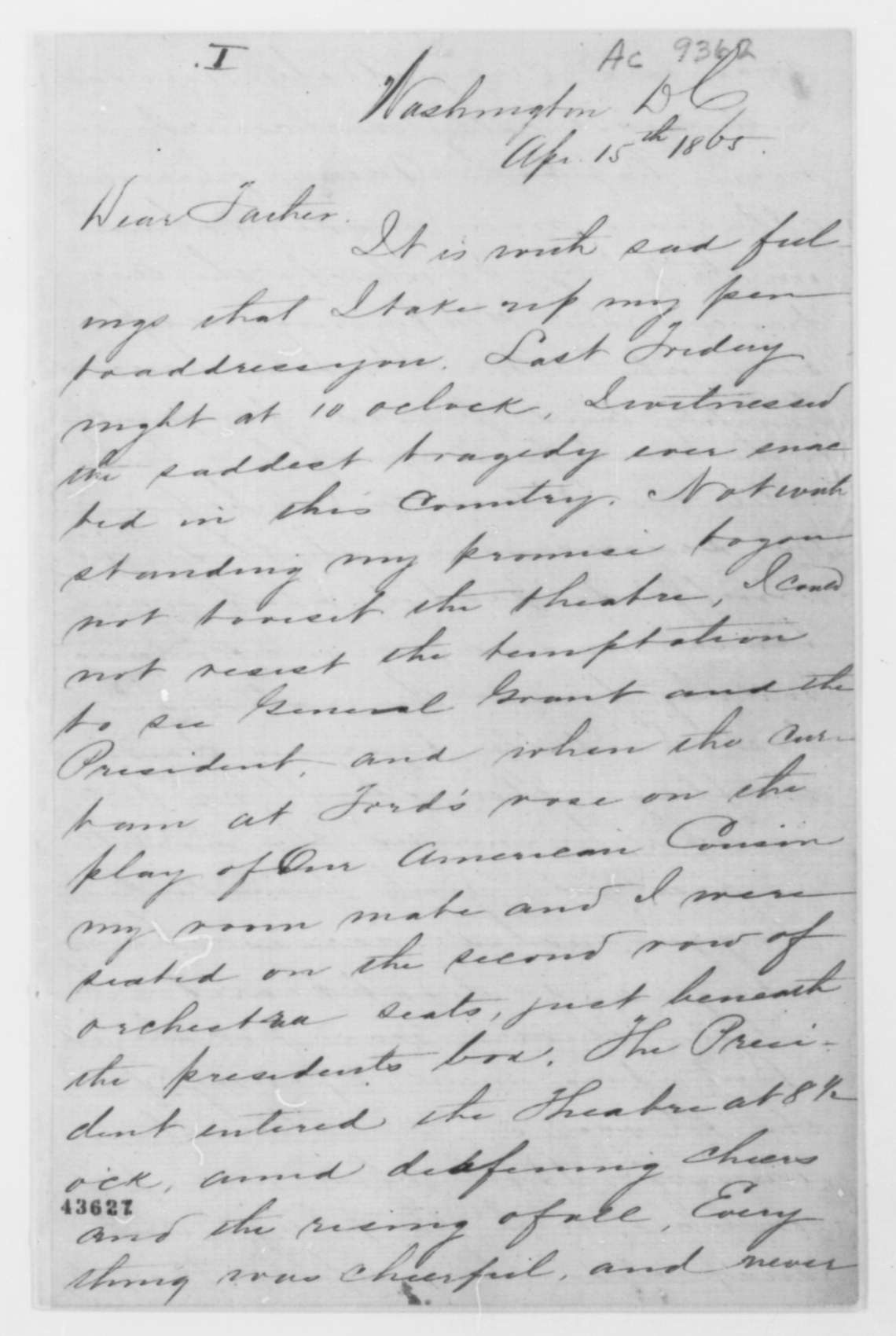
-
Description
James S. Knox, a witness to the assassination, writes a detailed letter to his father describing the event, as well as the attacks at the Seward home, and the national feeling, saying that "the nation is aroused and terrible will be its vengeance."
-
Source
-
Rights
This item is in the public domain and may be reproduced and used for any purpose, including research, teaching , private study, publication, broadcast or commercial use, with proper citation and attribution
-
Creator
James S. Knox
-
Date
April 15, 1865
from Apr. 16, 1865
"Arrest of Booth!"
-
Full Title
"Arrest of Booth!"
-
Description
An April 16, 1865 edition of the Daily Monitor Extra from Concord, Vermont that falsely reports the arrest of John Wilkes Booth.
-
Transcription
DAILY MONITOR EXTRA
SUNDAY, APRIL 16, 1865
Special Dispatches to the Concord Daily Monitor by the American Line and the Vermont and Canada Line.
ARREST OF BOOTH!
Arrangements for Mr. Lincoln’s Funeral.
President Johnson Retains the old Cabinet.
Mr. Hunter Secretary of State Pro Tem.
Mr. Seward & Son Doing Well.
Wm. Springer Arrested for Complicity with Booth.
Washington, April 15th. The details of the assassination have already been spread broadcost. All of the evidence which has been elicited during to-day and to-night, point beyond all doubts to John Wilkes Booth as the assassin of the President, and the ringleader in the diabolical plot.
It has not appeared that he has had more than two accomplices, while their object seems to have been more especially to take the life of the President. In the letters in Booth’s trunk, captured at the National Hotel, one desperado only seems to write of attacking the President, and somewhat deterred Booth to abandon his intention. This demonstrates clearly the matured plot, and disposes entirely of the stories of insanity. It is shown further by the testimony today, that Booth did not assassinate Secretary Seward and son, but left his accomplice to do that work. The theory that he did both deeds by disguising himself, is very effectually exploded. Those who have been thrown into Booth’s company for the past few days describe him as laboring under very strong mental excitement, occasioned by drink and the rejection of his suit by a young lady here, on the ground of his strong secession views.
Yesterday morning he sauntered into the box office at Ford’s Theatre, and learned incidentally that Gen. Grant and President Lincoln would visit the play last night. From that moment he undoubtedly resolved to commit the assassination that night. From the box office he went to the livery stable in the rear of the National, where at noon he hired a fleet horse.
At four o’clock he came into the National, took two cards from the clerk that had been left by two suspicious looking men, and calling for paper went behind the clerk’s desk and commenced writing. It was particularly noticed that he had a wild look, and was so absent minded as to ask the clerk in dating his note what hour it was.
At 6 o’clok [clock] he was promenading leisurely on Pennsylvania Avenue, dressed in his usual genteel manner. At half past seven he was again seen in the restaurant adjoining Ford’s Theatre, where he drank a glass of brandy. From thence he passed into the theatre where he was usually found about 8 o’clock. Soon after nine he went out and brought his horse to the front of the theatre and got Wm. Springler, the carpenter of the theatre, and now under arrest, to hold the animal. Booth was noticed to go into the theatre and pass around into the dress circle to the side on which the President was seated. The aisle next to the wall was crowded, so that he had considerable trouble in pushing his way through to the President’s box. On reaching there he was halted by the sentinel, who is placed there to prevent intrusion on the President. To the sentinel he mentioned the name of some distinguished gentleman who desired to see Mr. Lincoln, and being very neatly dressed was allowed to pass without suspicion.
The shooting as already detailed by telegraph then occurred.
Booth mounted his horse and fled, and at this writing, that is the last that has been seen of him. His accomdlice [accomplice] in this terrible crime is not so well known, but is believed to be a notorious Maryland desperado, named Surrat [Surratt].
WASHINGTON, April 15th—12 M. Up to a late hour no news of the whereabouts of the assassin has been received. Secretary Seward is very comfortable to-night. It is not believed that Fred. Seward will live till daylight. The New York train was allowed to bring in its passengers to-night.
About 11 o’clock on Friday evening two men crossed the Anacosta [Anacostia] Bridge, one of whom gave his name as Booth, and the other as Smith. The latter is said to be Surrat. A riderless horse was found last night, which has been identified by the proprietor of one of the stables as having been hired from his stable. To-day no one will be allowed to leave the city by rail conveyance or on foot, and the issue of papers from headpuarters [headquarters] of the Department of Washington has been suspended by Gen. Augur. It is understood that the intelligence of the death of the President has not been communicated to Secretary Seward, nor of the attack on his son, his critical condition rendering perfect quiet essential to his recovery.
1 A.M.—Secretary Seward was in apparently a comfortable condition. His son Frederick remains insensible, with less favorable symptoms than his father.
Secretary Seward retains his full mental faculties. He to-night was made aware of the death of the President. A strong military guard has been placed around the residence of the several Cabinet officers and around the Executive Mansion.
At midnight the condition of Secretary Seward was the same as last reported. The day of the funeral of the President has not yet been fixed. The remains will be removed to Springfield, Ill. The coffin for the President’s remains is covered with black cloth, and lined with lead, the latter being covered with white satin. A silver plate on the coffin, over the breast, bears the following inscription:
“ABRAHAM LINCOLN
16th President of the United States.
Born July 12, 1809. Died April 15, 1865.”
The remains have been embalmed. The external appearance of the face of the President was that of a deep black stain about both eyes; otherwise the face was very natural. The wound was in the left side of the head, behind the left ear. The course of the ball was obliquely forward, towards the right eye. The ball was found embedded five inches behind the right eye. The wound was half an inch in diameter.
It is said that the funeral of the President will take place on Thursday, in order to enable distant friends to arrive.
________________________
Official from Sec’y Stanton.
[By Vermont and Boston Telegraph Line—Office at the Depot.]
WAR DEPARTMENT, Washington, 15.
To Maj. Gen. Dix:
The official notice of the death of the late President Abraham Lincoln, was given by the heads of the departments this morning to Andrew Johnson, Vice President, upon whom by the Constitution devolved the office of President. Mr. Johnson, on receiving this notice, appeared before Chief Justice Chase and took the oath of office as President of the United States, and assumed its duties and functions. At 12 o’clock the President met the heads of the departments in a cabinet meeting at the Treasury building, and among other business the following was transacted: 1. The funeral of the late President was referred to the several secretaries, as far as relates to their respective departments. 2. William Hunter was appointed Acting Secretary of State during the disability of Mr. Seward, and his son Frederick Seward, the Assistant Secretary. 3. The President formally announced that he desired to retain the present secretaries of the departments for his cabinet, and they would go on and discharge their respective duties in the same manner as before the deplorable even[t] that had changed the head of the government.
All business in the departments was suspended during the day. The surgeons report that Mr. Seward’s condition remains unchanged. He is doing well. There is no improvement in Mr. Frederick Seward. The murderers have not yet been apprehended.
E. M. STANTON
________________
A dispatch received from Baltimore at 10 o'clock A.M., states that Booth has been arrested near Baltimore and is now confined on board of a Monitor for safe keeping. This dispatch seems to be entitled to credit though not yet officially confirmed. His accomplice is still at large.
________________
[Special to the Sunday Herald.]
WASHINGTON, April 15, 1:30 P. M.—The President is lying in state at the White House. No one is allowed to approach within two squares, except privileged persons. The man, William Springer [Edman Spangler], who held Booth’s horse at the door of Ford’s Theatre, has been arrested. The clerks at the National Hotel, where Booth boarded until last evening, state that two very suspicious persons called for him yesterday, and that in the evening all suddenly disappeared. A sentinel was placed in the passage-way to the private box occupied by the President before the performance commenced. Booth passed this sentry by giving the name of some Governor. These facts are arrived at from an authentic source, and evidence seems strong that Booth is after all the man who assassinated Secretary Seward.
_____________________
No further telegraphic dispatches will be received in this city before 5 o’clock th [this] afternoon. Ahything [anything] received at that hour will be promptly bulletined at this office.
_______________________
At the Episcopal church this morning prayers were read for the nation in its deep affliction, and the usual Easter festivities were deferred.
[Transcription by: Deborah Taylor] -
Source
Library of Congress, Alfred Whital Stern Collection of Lincolniana, portfolio 3, no. 9, Stern catalog 4754
-
Rights
This item is in the public domain and may be reproduced and used for any purpose, including research, teaching, private study, publication, broadcast or commercial use, with proper citation and attribution
-
Tags
-
Cite this Item
Daily Monitor Extra. ""Arrest of Booth!"". Remembering Lincoln. Web. Accessed December 15, 2025. https://rememberinglincoln.fords.org/node/751
-
Creator
Daily Monitor Extra
-
Date
April 16, 1865
from Apr. 16, 1865
"Arrest of Booth!"
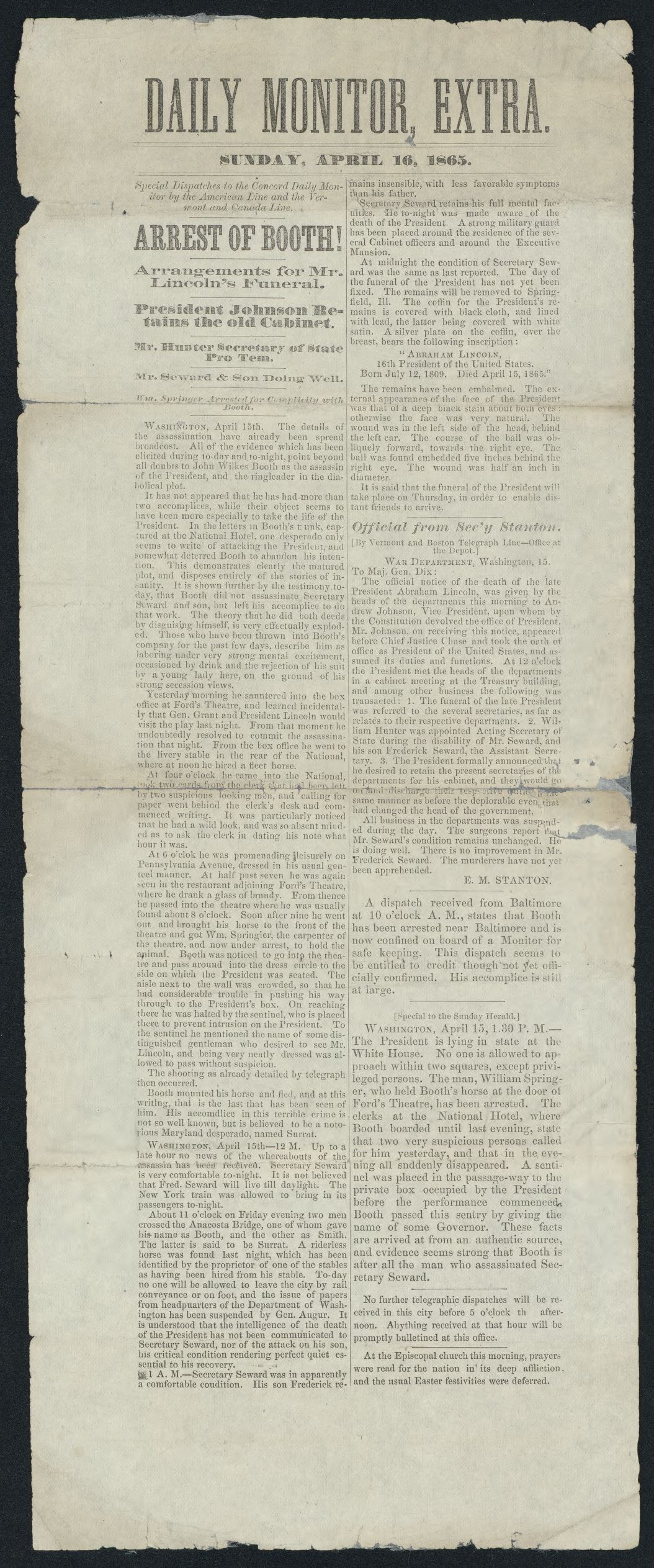
-
Description
An April 16, 1865 edition of the Daily Monitor Extra from Concord, Vermont that falsely reports the arrest of John Wilkes Booth.
-
Source
Library of Congress, Alfred Whital Stern Collection of Lincolniana, portfolio 3, no. 9, Stern catalog 4754
-
Rights
This item is in the public domain and may be reproduced and used for any purpose, including research, teaching, private study, publication, broadcast or commercial use, with proper citation and attribution
-
Creator
Daily Monitor Extra
-
Date
April 16, 1865
from May. 2, 1865
Dispatch: William Hunter to Charles Francis Adams
-
Full Title
State Department Instruction 1383: William Hunter to Charles Francis Adams
-
Description
Dispatch from Acting Secretary of State William H. Hunter to Charles Francis Adams, U.S. Minister to the United Kingdom, concerning the latest news about the funeral of the assassinated President Abraham Lincoln (his body was in Chicago), the death of assassin John Wilkes Booth, and the surrender of Confederate General Joseph Johnston.
-
Transcription
Recd 14 May 1865
No 1383 Department of State Washington, 2nd May 1865
Sir:
The public press will have informed you of the honor done by the people to the remains of our lamented President on their transit of this city to Chicago which point they have now reached. The assassination, and the other atrocious attempt, have called forth gratifying expressions of condolence and sympathy from foreigners resident in the United States and from the Government and many of the cities of Canada.
With reference to military events I will mention that Macon Georgia was captured by General Wilson on the 13th ultimo when he was notified by Genl Sherman of the truce and withdrew.
When the truce between General Sherman and Johnston and the proposed terms of surrender were reported
Charles Francis Adams Esqre
[Transcription by: Taryn S. and her father David, Mr. Rude’s class, New Hampton Middle School, New Hampton, Iowa.]
-
Source
Office of the Historian, U.S. Department of State and National Archives, Record Group 84
-
Rights
This item is in the public domain and may be reproduced and used for any purpose, including research, teaching, private study, publication, broadcast or commercial use, with proper citation and attribution.
-
Tags
-
Cite this Item
William Hunter. "State Department Instruction 1383: William Hunter to Charles Francis Adams". Remembering Lincoln. Web. Accessed December 15, 2025. https://rememberinglincoln.fords.org/node/748
-
Creator
William Hunter
-
Date
May 2, 1865
from May. 2, 1865
State Department Instruction 1383: William Hunter to Charles Francis Adams
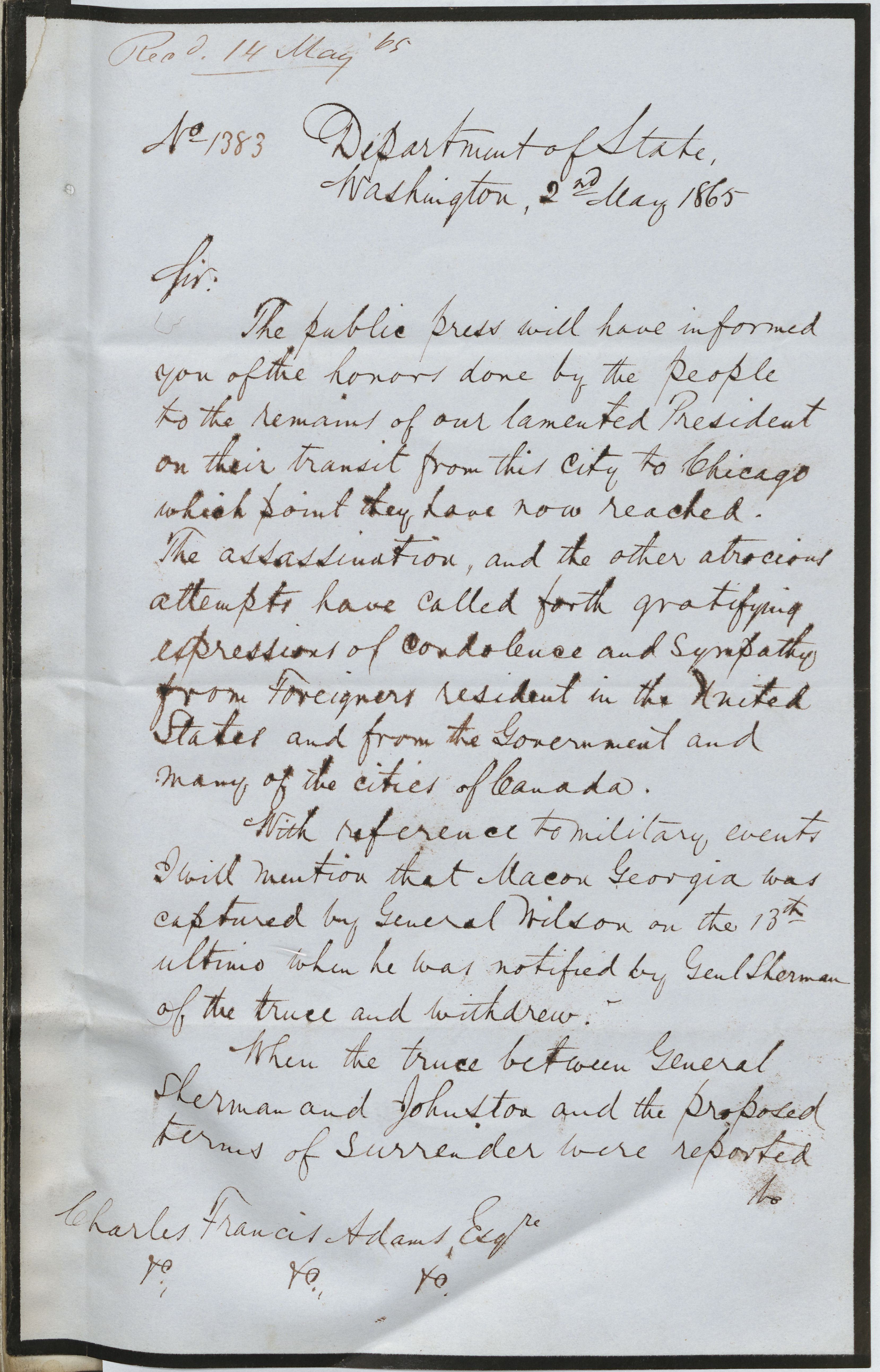
-
Description
Dispatch from Acting Secretary of State William H. Hunter to Charles Francis Adams, U.S. Minister to the United Kingdom, concerning the latest news about the funeral of the assassinated President Abraham Lincoln (his body was in Chicago), the death of assassin John Wilkes Booth, and the surrender of Confederate General Joseph Johnston.
-
Source
Office of the Historian, U.S. Department of State and National Archives, Record Group 84
-
Rights
This item is in the public domain and may be reproduced and used for any purpose, including research, teaching, private study, publication, broadcast or commercial use, with proper citation and attribution.
-
Creator
William Hunter
-
Date
May 2, 1865
from Apr. 28, 1865
Dispatch: Charles Francis Adams to Seward
-
Full Title
Embassy Despatch 936: Charles Francis Adams to William H. Seward
-
Description
Official dispatch from Charles Francis Adams, U.S. Minister to the United Kingdom, to William H. Seward, Secretary of State, acknowledging receipt of the news of the attacks upon Seward and President Abraham Lincoln, and discussing reaction in London.
-
Transcription
Aug 13, my [[Lincoln]]
[[tchfy1408]] [[Abe]]
No. 936.
Legation of the United States
London, 28 April, 1865
Sir:
I had the grief to receive the
day before yesterday the telegraphic
Despatches from Mr. Stanton, the
Secretary of War, and from Mr.
Hunter, the Chief Clerk of your
Department, announcing the af-
flicting event of the 14th, Instant
which has thrown our whole
people into such deep distress.
They also give a narrative of the
simultaneously savage onslaught
upon yourself in your sick room
and upon your son, the assistant
Secretary, which had not at the
latest date, and which I yet
permit myself to hope, will not
prove
The Hon: William H. Seward
Secretary of State.
Washington, D.C.
(Next Page)
prove fatal to either you.
I immediately took the
requisite measures to communicate
the intelligence to the different
legislators on the Continent.
It is but consistency that
a rebellion began in
perjury, treachery and fraud
should close with private
assassination.
The whole of the day was
one of the greatest excitements.
Few events of the present century
have created such general
consternation and indignation.
Many people called personally
at the legation to express their
deep sympathy and many more
sent me notes of the same tenor.
The notice taken by the
press are almost all of them
of a most honorable character.
(A. Hancock)
I transmit copies of the
leading newspapers. There
seems at last to be a general
testimony borne to the north noble
qualities
(Next Page)
qualities of the president and
the friendly disposition of the
Secretary of State.
Of all this eulogy he found
mingled with the alloy of
unworthy aspersions of the vice
President who succeeds, he has
abundant consolation in the
reflection that, when his predecessor
began, he was not a whit better
treated. It is a weakness of the
press and the people of this country
not to value some men properly
until they are lost. The cause of
the late Prince Consort is a
unremarkable instance.
The proceedings in the two
Houses of Parliament last evening
mark out the line proposed to
be adopted by the government
on this occasion.
I have the honor to be Sir,
your obedient servant,
Charles Francis Adams
[Transcription Team: Carli G., Summer D., Joslyn P., Tyler R.]
[New Hampton Middle School, New Hampton, Iowa] -
Source
Office of the Historian, U.S. Department of State and National Archives, Record Group 84
-
Rights
This item is in the public domain and may be reproduced and used for any purpose, including research, teaching, private study, publication, broadcast or commercial use, with proper citation and attribution.
-
Tags
-
Cite this Item
Charles Francis Adams. "Embassy Despatch 936: Charles Francis Adams to William H. Seward". Remembering Lincoln. Web. Accessed December 15, 2025. https://rememberinglincoln.fords.org/node/745
-
Creator
Charles Francis Adams
-
Date
April 28, 1865
from Apr. 28, 1865
Embassy Despatch 936: Charles Francis Adams to William H. Seward
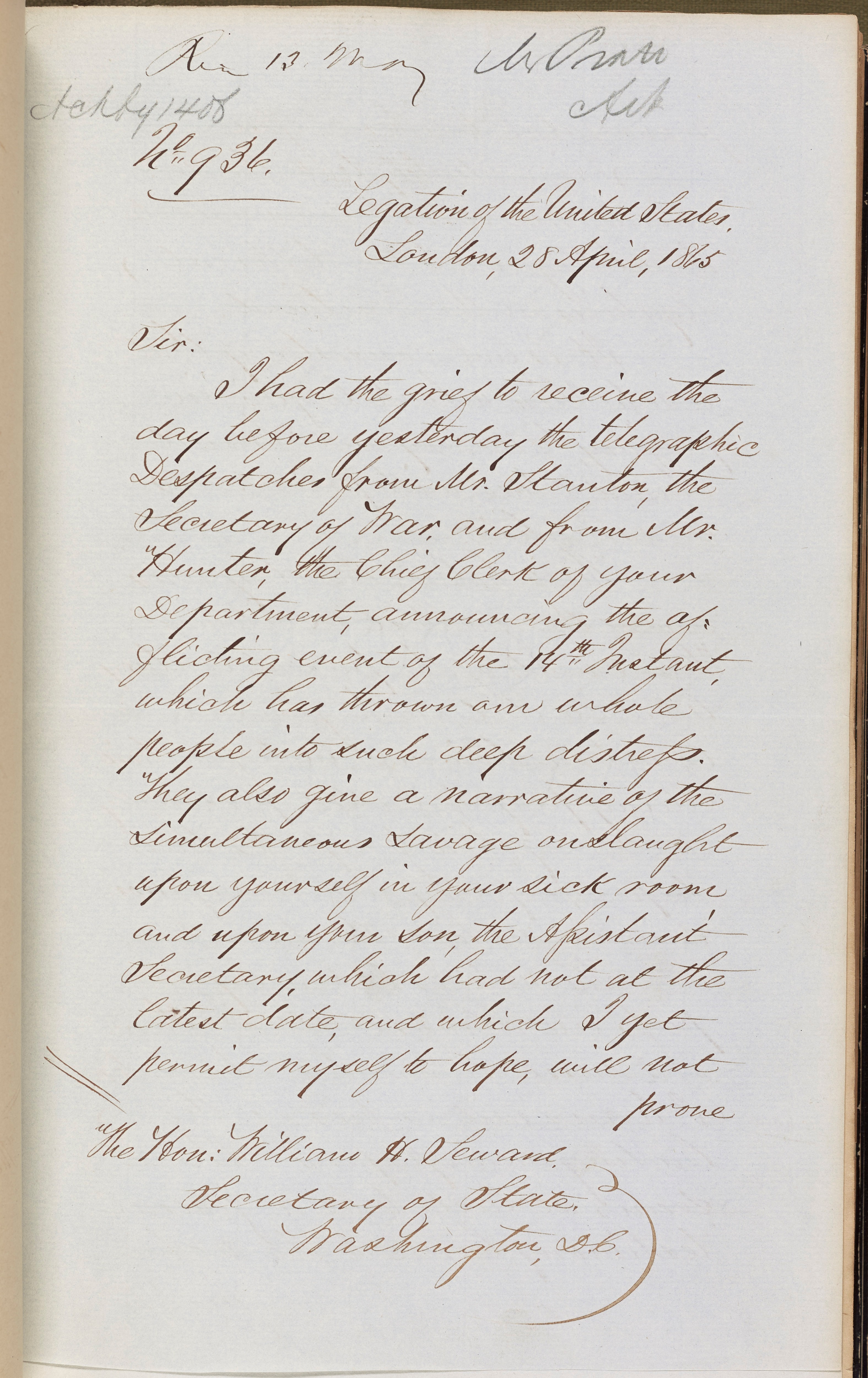
-
Description
Official dispatch from Charles Francis Adams, U.S. Minister to the United Kingdom, to William H. Seward, Secretary of State, acknowledging receipt of the news of the attacks upon Seward and President Abraham Lincoln, and discussing reaction in London.
-
Source
Office of the Historian, U.S. Department of State and National Archives, Record Group 84
-
Rights
This item is in the public domain and may be reproduced and used for any purpose, including research, teaching, private study, publication, broadcast or commercial use, with proper citation and attribution.
-
Creator
Charles Francis Adams
-
Date
April 28, 1865
from Apr. 17, 1865
Instruction, Hunter to Adams
-
Full Title
State Department Instruction 1352: William Hunter to Charles Francis Adams
-
Description
Official dispatch from William H. Hunter to Charles Francis Adams, U.S. Minister to the United Kingdom, informing him of Lincoln's assassination and the attempt on Secretary of State William H. Seward's life. Hunter notes that William and Frederick Seward are both expected to recover, but that, in the meanwhile, Hunter is serving as Acting Secretary of State. Because the Transatlantic telegraph cable was no longer functioning, Adams received this dispatch on April 30.
-
Transcription
Read. 30 Apr. 65.
Circular
No. 1352
Department of state.
Washington. 17th April 1865
Sir:
The melancholy duty devolves
upon me officially to apprise
You of the assassination of the
president at Ford’s theatre in this
city in the evening of the 14th instant.
He died the next morning from
the effects of the wound.
About the same time an
attempt was made to assassinate
the Secretary of State in his own
house where he was in bed &
Suffering from the effects of the
late accident. The attempt failed, but Mr. Seward was
severely cut, on the face especially
it is supposed with a bowie knife.
Mr J; H, Seward was felled by a
blow or blows on the head, from
the assassin, and for some time
afterwards was apparently
Unconscious
Charles Francis Adam, Esquire,
Next page
Unconscious. Both the Secretary
and assistant Secretary are better
especially the former.
Andrew Johnson has formally
entered upon the duties of
President.
I have been authorized
temporarily to act as Ssecretary
of State.
[[?]], Sir
Your obedient servant
W.J. Hunter
Acting Secretary
[Transcription Team: Joshua H., Caleb D., Conner R., Carson B.]
[New Hampton Middle School, New Hampton, Iowa]
-
Source
Office of the Historian, U.S. Department of State and National Archives, Record Group 84
-
Rights
This item is in the public domain and may be reproduced and used for any purpose, including research, teaching, private study, publication, broadcast or commercial use, with proper citation and attribution.
-
Tags
-
Cite this Item
William Hunter. "State Department Instruction 1352: William Hunter to Charles Francis Adams". Remembering Lincoln. Web. Accessed December 15, 2025. https://rememberinglincoln.fords.org/node/744
-
Creator
William Hunter
-
Date
April 17, 1865
from Apr. 17, 1865
State Department Instruction 1352: William Hunter to Charles Francis Adams
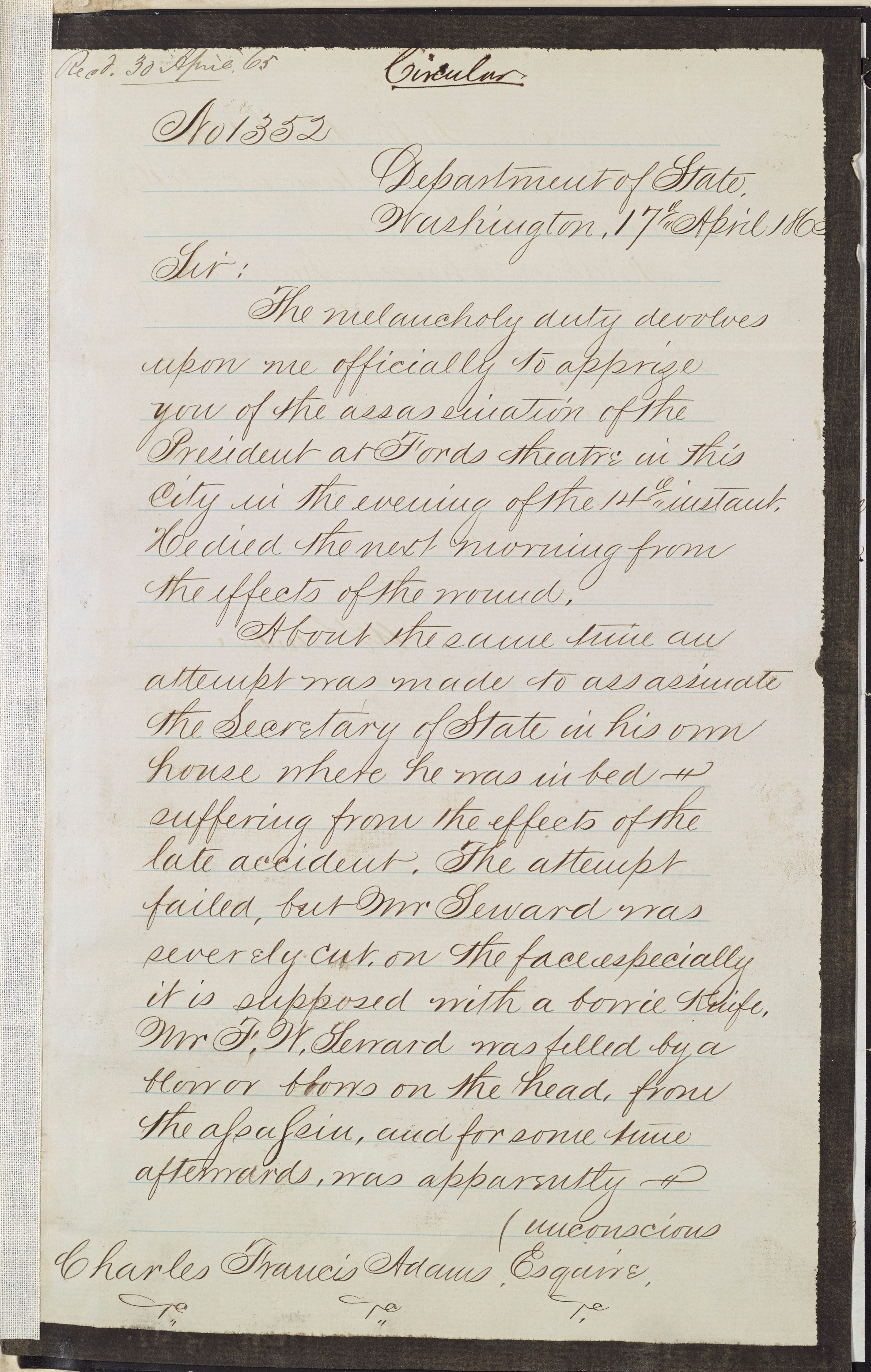
-
Description
Official dispatch from William H. Hunter to Charles Francis Adams, U.S. Minister to the United Kingdom, informing him of Lincoln's assassination and the attempt on Secretary of State William H. Seward's life. Hunter notes that William and Frederick Seward are both expected to recover, but that, in the meanwhile, Hunter is serving as Acting Secretary of State. Because the Transatlantic telegraph cable was no longer functioning, Adams received this dispatch on April 30.
-
Source
Office of the Historian, U.S. Department of State and National Archives, Record Group 84
-
Rights
This item is in the public domain and may be reproduced and used for any purpose, including research, teaching, private study, publication, broadcast or commercial use, with proper citation and attribution.
-
Creator
William Hunter
-
Date
April 17, 1865
from Apr. 15, 1865
Stanton Dispatch to Charles Francis Adams
-
Full Title
Dispatch, Edwin Stanton to Charles Francis Adams
-
Description
The official dispatch from U.S. Secretary of War Edwin Stanton to Charles Francis Adams, U.S. Minister to the United Kingdom, notifying the latter of the assassination of President Abraham Lincoln. Because the Transatlantic telegraph line was no longer operational, Adams did not receive the news for 11 days.
-
Transcription
Recd. 26 April, 1865
Charles Francis Adams
United States Minister, London
Washington, DC 15 April, 1865
Sir.
It has become my distressing duty to announce to you that last night His Excellency Abraham Lincoln President of The United States, was assassinated, about the hour of half past 10 o’clock, in his private box at Ford’s Theatre, in this city. The President about eight o’clock accompanied Mrs. Lincoln to the theatre. Another lady and gentleman were with them in the box. About half past ten during a pause in the performance, the assassin entered the box, the door of which was unguarded, hastily approached the President from behind, and discharged a pistol at his head. The bullet entered the back of his head, and penetrated nearly through. The assassin then leaped from the box upon the stage, brandishing a large knife or dagger, and exclaiming ‘Sic semper tyrannis!’ and escaped in the rear of the theatre. Immediately upon the discharge the President fell to the floor insensible, and continued in that state until 20 minutes past 7 o’clock this morning when he breathed his last. About the same time the murder was being committed at the Theatre another assassin presented himself at the door of Mr. Seward’s residence, gained admission by representing he had a prescription from Mr. Seward’s physicians which he was directed to see administered and hurried up to the third story chamber where Mr. Seward was lying. He here discovered Mr. Frederick Seward, struck him over the head, inflicting several wounds, and fracturing the skull in two places, inflicting, it is feared mortal wounds. He then rushed into the room where Mr. Seward was in bed, attended by a young daughter and a male nurse. The male attendant was stabbed through the lungs, and it is believed will die. The assassin then struck Mr. Seward with a knife or dagger twice in the throat and twice in the face, inflicting terrible wounds. By this time Major Seward, eldest son of the Secretary, and another attendant reached the room, and rushed to the rescue of the Secretary; they were also wounded in the conflict, and the assassin escaped. No artery or important blood vessel was severed by any of the wounds inflicted upon him, but he was for a long time insensible from the loss of blood. Some hope of his possible recovery is entertained. Immediately upon the death of the President notice was given to Vice President Johnson, who happened to be in the City, and upon whom the office of President now devolves. He will take the office and assume the functions of President to-day. The murderer of the President has been discovered, and evidence obtained that these horrible crimes were committed in execution of conspiracy deliberately planned and set on foot by rebels on pretence of avenging the South and aiding the rebel cause; but it is hoped that the (?) perpetrators will be caught.
The feeling occasioned by these atrocious crimes is so great, sudden, and overwhelming that I cannot at present do more than communicate them to you. At the earliest moment yesterday the late President called a Cabinet meeting, at which General Grant was present. He was more cheerful and happy than I had ever seen him, rejoiced at the near prospect of firm and durable peace at home and abroad, manifested in a marked degree the kindness and humanity of his disposition, and the tender and forgiving spirit that so eminently distinguished him. Public notice had been given that he and General Grant, would be present at the Theatre, and the opportunity of adding the Lieutenant General to the number of victims to be murdered was no doubt seized for the fitting occasion of executing the plans that appear to have been in preparation for some weeks, but General Grant was compelled to be absent, and thus escaped the designs upon him. It is needless for me to say anything in regard to the influence which this atrocious murder of the President may exercise upon the affairs of this country, but I will only add that, horrible as are the atrocities that have been resorted to by the enemies of the country, they are not likely in any degree to impair the public spirit, or postpone the complete and final overthrow of the rebellion. In profound grief for the events, which it has become my duty to communicate to you,
I have the honor to be
Very respectfully
Your obt. Servant
Edwin M. Stanton
[Transcription by Dale Anderson.] -
Source
Office of the Historian, U.S. Department of State and National Archives, Record Group 84
-
Rights
This item is in the public domain and may be reproduced and used for any purpose, including research, teaching, private study, publication, broadcast or commercial use, with proper citation and attribution.
-
Tags
-
Cite this Item
Edwin Stanton. "Dispatch, Edwin Stanton to Charles Francis Adams". Remembering Lincoln. Web. Accessed December 15, 2025. https://rememberinglincoln.fords.org/node/743
-
Creator
Edwin Stanton
-
Date
April 15, 1865
from Apr. 15, 1865
Dispatch, Edwin Stanton to Charles Francis Adams

-
Description
The official dispatch from U.S. Secretary of War Edwin Stanton to Charles Francis Adams, U.S. Minister to the United Kingdom, notifying the latter of the assassination of President Abraham Lincoln. Because the Transatlantic telegraph line was no longer operational, Adams did not receive the news for 11 days.
-
Source
Office of the Historian, U.S. Department of State and National Archives, Record Group 84
-
Rights
This item is in the public domain and may be reproduced and used for any purpose, including research, teaching, private study, publication, broadcast or commercial use, with proper citation and attribution.
-
Creator
Edwin Stanton
-
Date
April 15, 1865
from
"The President DEAD!"
-
Full Title
"The President DEAD!"
-
Description
Front page of the Boston Globe declaring "The President DEAD!" and includes a quote from future president James Garfield, "God Reigns and the Government at Washington Still Lives."
-
Transcription
BOSTON GLOBE
The President
DEAD!
“God Reigns and the Government of Washington Still Lives.” ----Gen. Garfield on Lincoln’s Assassination.
[Transcription by: Dr. Susan Corbesero, Ellis School, Pittsburgh, Pennsylvania]
-
Source
Library of Congress, Alfred Whital Stern Collection of Lincolniana portfolio 13, no. 9
-
Rights
This item is in the public domain and may be reproduced and used for any purpose, including research, teaching, private study, publication, broadcast or commercial use, with proper citation and attribution
-
Tags
-
Cite this Item
The Boston Globe. ""The President DEAD!"". Remembering Lincoln. Web. Accessed December 15, 2025. https://rememberinglincoln.fords.org/node/733
-
Creator
The Boston Globe
from
"The President DEAD!"
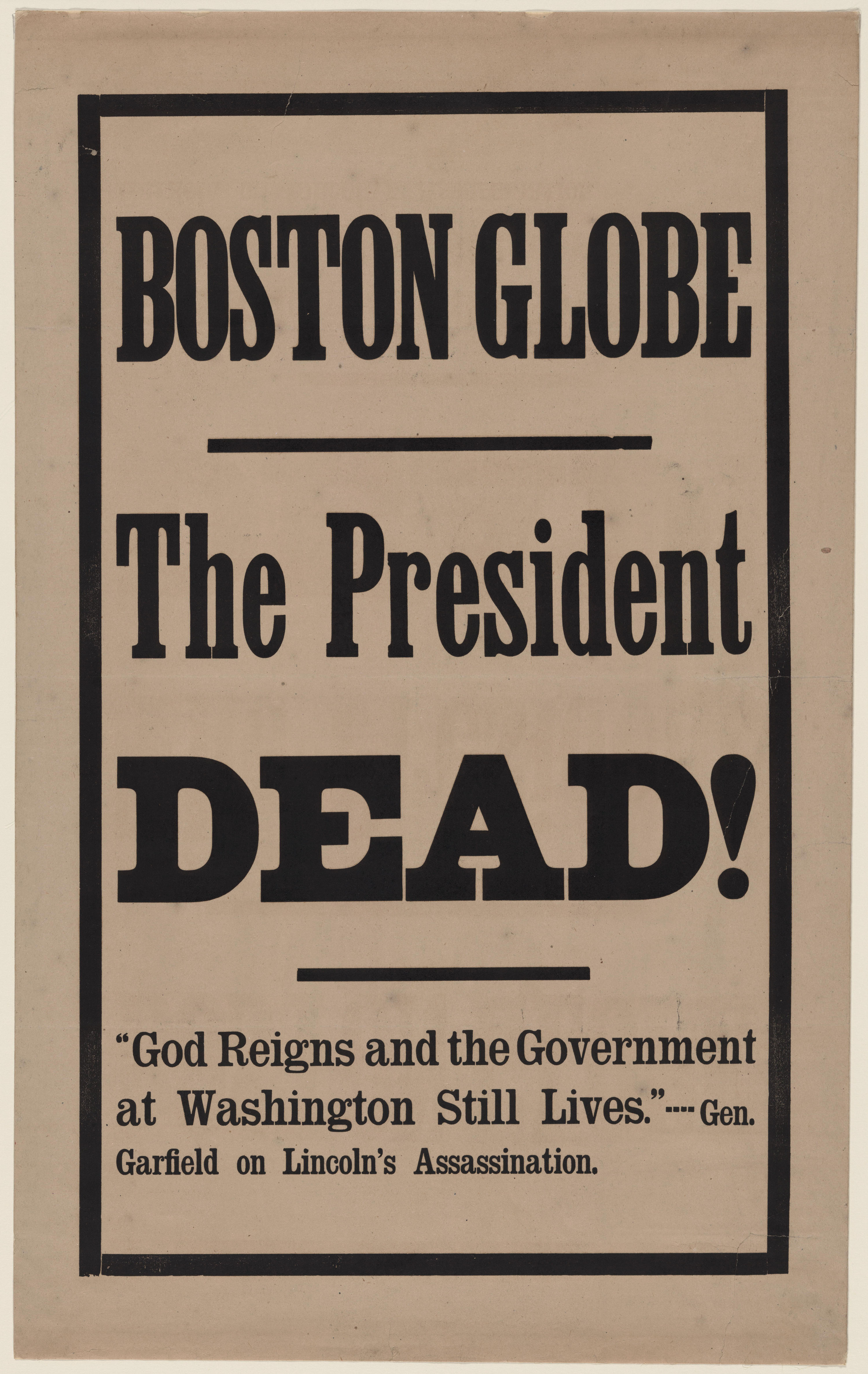
-
Description
Front page of the Boston Globe declaring "The President DEAD!" and includes a quote from future president James Garfield, "God Reigns and the Government at Washington Still Lives."
-
Source
Library of Congress, Alfred Whital Stern Collection of Lincolniana portfolio 13, no. 9
-
Rights
This item is in the public domain and may be reproduced and used for any purpose, including research, teaching, private study, publication, broadcast or commercial use, with proper citation and attribution
-
Creator
The Boston Globe
from Apr. 25, 1865
Appropriate Ceremonies
-
Full Title
Appropriate Ceremonies
-
Transcription
"Cheney's Grove, April 20th, 1865 - Ed. Pantagraph -- According to previous arrangement the people of this community met on yesterday morning at the residence of Willis Rowe for purpose of forming a funeral procession in token of our respect for the memory of Abraham Lincoln. The procession was formed by Lieut. S. R. Riggs assisted by H. P. Lowry and was as follows: 1st, The Goddess of Liberty draped in mourning, represented by Mrs. S. R. Riggs. 2nd, The national flag at half mast also in mourning. 3d, Thirty-five young ladies on horseback dressed in black. 4th, A company of soldiers in uniform. 5th, Martial music. After these was a large number of persons in carriages, wagons, and on horse back. The procession then proceeded to the new Church in Saybrook, where an eloquent and touching discourse was delivered by Rev. C. G. Bradshaw..."
-
Source
McLean County Museum of History
-
Rights
Creative Commons Attribution-NonCommercial-ShareAlike (CC-BY-NC-SA)
-
Tags
-
Cite this Item
The Pantagraph. "Appropriate Ceremonies". Remembering Lincoln. Web. Accessed December 15, 2025. https://rememberinglincoln.fords.org/node/721
from Apr. 25, 1865
Appropriate Ceremonies
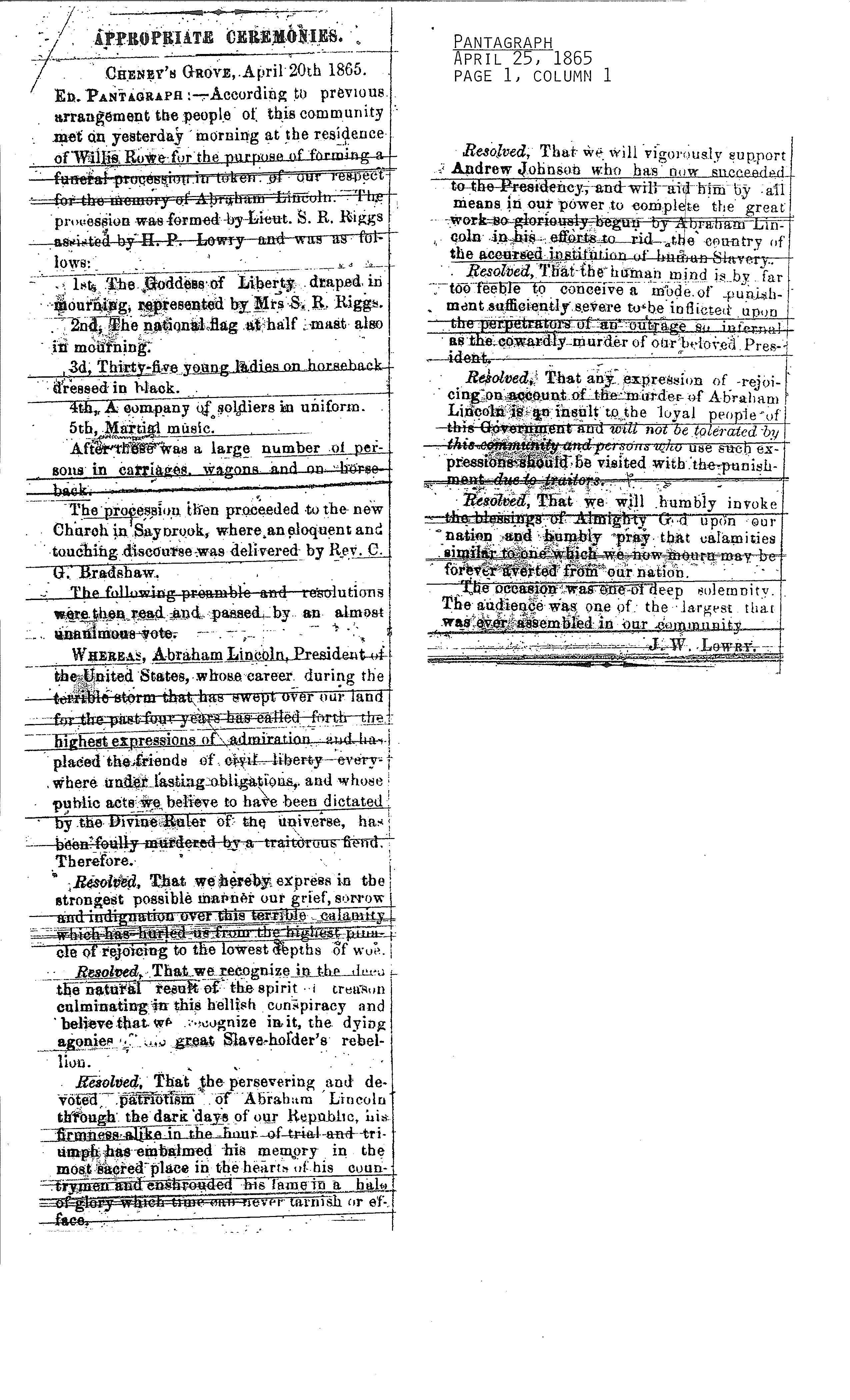
-
Source
McLean County Museum of History
-
Rights
Creative Commons Attribution-NonCommercial-ShareAlike (CC-BY-NC-SA)
-
Creator
The Pantagraph
-
Date
April 25, 1865
from Feb. 12, 1942
Rose Whipp Northrup Reminiscence
-
Full Title
Rose Whipp Northrup Reminiscence
-
Transcription
SUPERNATURAL VISIT WITH FRIEND?
Mrs. Northrup Recalls Vision of Lincoln at His Old Desk
Trip to Office in Springfield Inspires ‘Sight’
“Mother! Look at that desk. Do you see the long legs resting on the desk, and the tall, dark man lean-ing back in his chair?”
“Why, daughter-I see the desk. That was Abraham Lincoln’s desk. But there are no long legs now resting on the desk, nor any tall man leaning back in the chair.”
Supernatural? A spirit pheno-menon?
“It was so vivid, so startling, that it seemed supernatural to me,” said Mrs. Rose Northrup, aged 91 as she recalled in Mennonite hos-pital Monday this “vision” of Abraham Lincoln, whom she had known as a kind friend many years before.
Revisited Room
The “vision” had been an actuality in the childhood of Rose Whipp, later Mrs. Northrup, for when she was 7 years old she had often seen Lincoln’s long legs on his desk, had seen the tall, dark man leaning back in his chair.
When Rose years later, with her mother, revisited the little room where the famous desk still stood, instantly the specter figure of Lin-coln appeared, so real that she now says it was “supernatural,” and she had difficulty in trying to make her mother “see” what she as a child had so often actually seen.
Mrs. Northrup, who has been a patient, at Mennonite hospital since last September, forgot her in-firmity for the moment-forgot the years which have burdened her frail body, as she talked in animat-ed vigor of the memories which grew from her girlhood friendship with the Lincoln family and chiefly with the great man and afterward martyred President.
Lived in Same Block.
Rose Whipp is a daughter of John W. Whipp of Bloomington, who got a job as assistant state treasurer in the 50’s and had moved his family to Springfield. There the Whipps and the Lin-colns lived in houses in the same block. Mr. Whipp worked in the state house, where Lincoln spent much time. Rose ran in and out of his office as if she were his own child. Lincoln often took Rose on his lap, stroked her blond locks and called her “silverhair.”
But not all memories of Mrs. Northrup connected with Lincoln are pleasant ones. Some were ex-tremely sad-some tragic.
For instance, when the Whipp family had moved back to Bloom-ington and the “tall, dark man” had become President.
Rose returned to her home one morning and found her mother in anguished tears.
Swear Vengeance.
“What’s the matter, mother?” she asked.
“Oh, they have assassinated our dear President,” the mother an-swered.
Then mother and daughter start-ed down the street toward the courthouse. Hundreds of others were streaming in the same direction. At the public square a great crowd had gathered and men were making speeches,
“And many men were cursing and swearing vengeance on the perpetrators of the awful murder of Lincoln,” said Mrs. Northrup. Mother and daughter stood around downtown until the indignation meeting had ended. A picture of that gathering is one of the historic scene of local history.
Clear memory of Past.
Then there was the time, Mrs. Northrup recalls, when she went with her father and uncle to at-tend funeral services for Lincoln at Springfield.
The town was one of vast mourning assemblage. Bands played dirges and familiar hymns. Flags and mourning emblems hung from all the buildings. “Come Ye Discon-solate,” and “Peace, Troubled Soul,” were two of the tunes oftenmost played, Mrs. Northrup recalls.
Mrs. Northrup has a remarkably clear memory of the past; not alone for those memorable days when she played in the office of Lincoln, but for many other years in which Springfield and Bloomington history have enriched her life.
She celebrated her 91st birthday in the hospital last September, when nurses and visiting friends gave her a real party, which she speaks of as one of the happy events of her recent life.
[Transcription by Alicia B., Ford's Theatre Society.] -
Rights
Creative Commons Attribution-NonCommercial-ShareAlike (CC-BY-NC-SA)
-
Tags
-
Cite this Item
The Pantagraph. "Rose Whipp Northrup Reminiscence ". The Pantagraph. Remembering Lincoln. Web. Accessed December 15, 2025. https://rememberinglincoln.fords.org/node/720
from Feb. 12, 1942
Rose Whipp Northrup Reminiscence
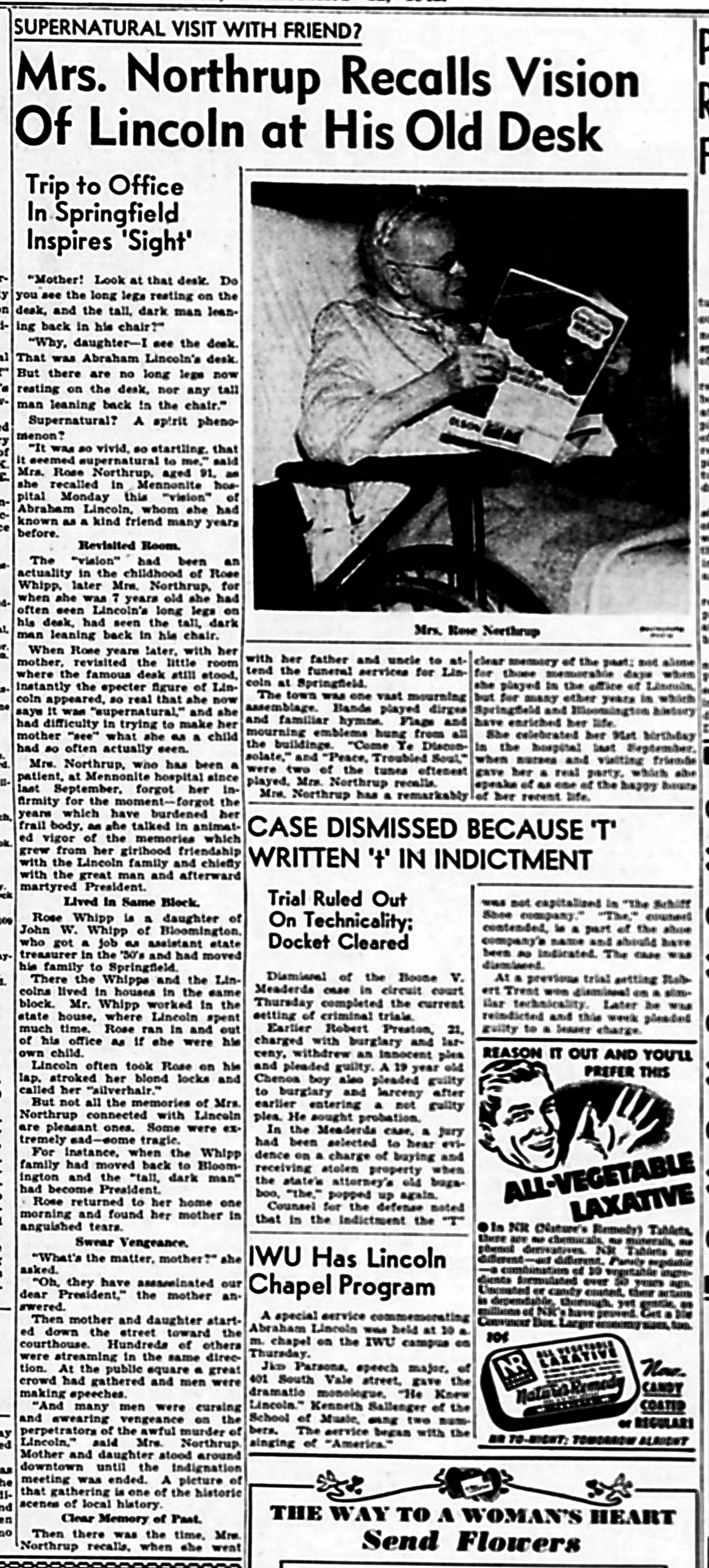
-
Rights
Creative Commons Attribution-NonCommercial-ShareAlike (CC-BY-NC-SA)
-
Creator
The Pantagraph
-
Publisher
The Pantagraph
-
Date
February 12, 1942
